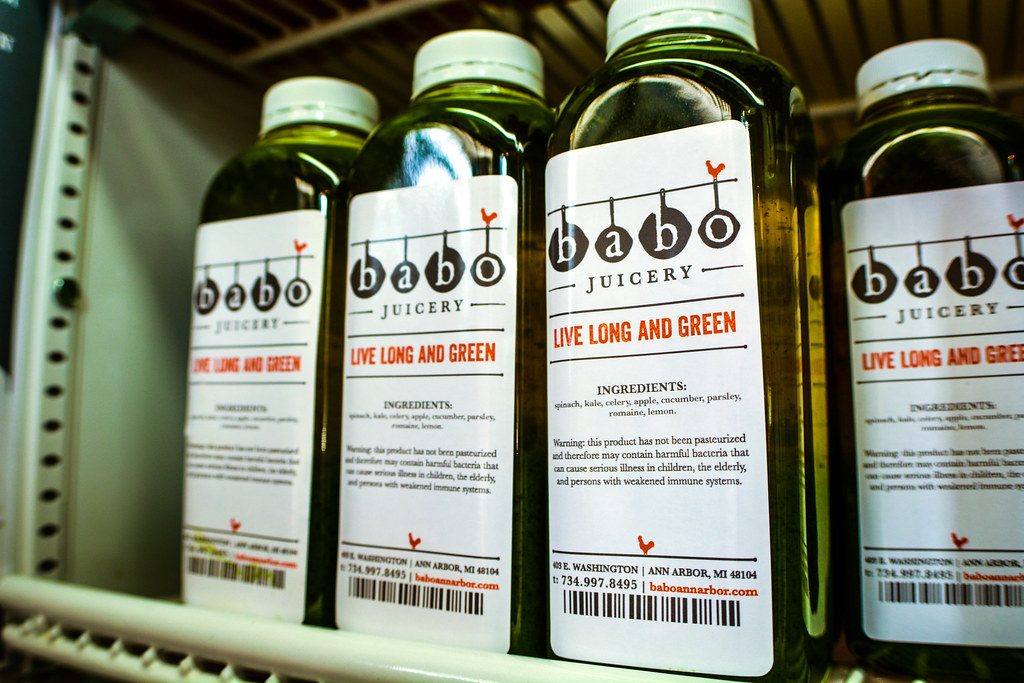As I opened the fridge on one of my mid-afternoon snack breaks, I came face to face with a case of several sleek plastic bottles, each filled with a different freshly squeezed juice. Ranging from bright green to deep fuchsia, the middle shelf was like a large, edible Crayola box.
“You can have any of those,” my roommate said from the other room. “I started a juice cleanse yesterday but I threw up this morning. It did not sit very well.”
Babo, a local boutique grocery store nearby had always had a small supply of freshly squeezed juices but recently, they had opened up a full scale, several day juice cleanse service. For either a 3, 5 or 7 day increment, you hand over a hefty portion of your monthly income in exchange for a liquid diet and the promise of an intestinal system that is clean as a whistle.

Photo by Anna Hsu
While I had no real desire to undergo the physical and mental stress of elimination all solid food, caffeine and alcohol from my diet, as a big fanatic of kale, I was intrigued and grabbed a bottle. But under the wariness of my roommate’s experience with a juice-only regiment, I drank the juices simply as an accompaniment to my meals.
Luckily, I survived several days with the juices in tow and no drastic dashes to the bathroom. At the same time, I began to wonder, what’s the hype with all these juice cleanses? Babo was certainly not the first or the last to hop on the bandwagon. In fact, cleanses have existed for millions of years in many different cultures, most often manifesting as religious fasting. Fasting is often heralded as a tool to focus less on the body, and more on connecting with one’s spiritual thoughts. Some have even claimed extreme physical sensations while enduring any kind of fasting, such as a lightness or purity that can be a very introspective and self-reflective experience.
At the same time, you rarely see juice cleanses affiliated with religious groups. In fact, popular brands like BluePrint Cleanse or Organic Avenue are entirely rooted in 21st century conventions about health and wellness, particularly weight loss. As we learn more and more about how our bodies work and the public at large uses the plethora of widely accessible information to join the conversation, juice cleanses have become yet another pillar of what it means to be healthy in today’s modern world.
According to Urban Remedy, a juice cleanse is a “short-term, fresh, raw, all liquid diet intended to cleanse both the mental and physical state… The primary physical reason for a juice cleanse is to give the digestive system a break from processing heavy proteins and fat, in addition to filtering the liver, kidneys and gall bladder. The result is clean energy and a full release of toxins.” Urban Remedy also stresses the idea that a juice cleanse is not a diet. Rather, it is a fixed period of time in which you are imperatively aware of what you put into your body, in order to reset and reboot your taste buds so that when it’s over, you can start eating healthier on your own.
In this day and age of hyper-scrutiny and self-improvement, juice cleanses are becoming a major trend. Their fixed, convenient and controlled structure allow even the busiest of people to work on their health. In many ways, they demonstrate a social awareness, an aptitude for understanding that we know our bodies won’t last like this forever if we keep stuffing them with chicken nuggets and donuts. Whether or not it is realized, partaking in a juice cleanse connotes a certain social and political stance, namely that health is an industrial market that can be monetized. And within these modern social parameters, juice cleanses can still be considered a spiritual purification, even if there is no proclaimed religious motivation. Instead of purifying our spirits in accordance to the laws of God, we are purifying our bodies in accordance to the laws of Gwyneth Paltrow and the USDA organic certification.
Because of this social affiliation, juice cleanses can get a lot of flack for being incredibly superfluous and pompous. The fact remains that the inner workings of our bodies are still by and large unknown. While many people can attest to the emotional and physical perks of being on a juice cleanse, there is still a significant lacking in scientific data to reinforce those claims.
In addition, many people think that juice cleanses do more damage than good, especially when it comes to establishing healthy eating habits. In a New York Times article about juice cleanses, Marianne Gillow, a New York-based psychiatrist, stated that she feared juice cleanses “fuel obsessive thinking.” This is particularly dangerous given the fact that people who have trouble watching their weight tend to be rather extreme about things. As such, she believes that “cleansing doesn’t allow you to make peace with real food.”

Photo by Anna Hsu
After a few sips of my beet juice, I began to understand the almost addictive draw of jumping on the minimalist diet train. The juices are incredibly refreshing, immediately boosting your energy levels. And because you are essentially removing all structural fibers, it is a powerfully punch of all natural sweetness. It wasn’t long before the grilled cheese sandwich I was eating at the same time began to feel incredibly dense and almost too rich. The juice on the other hand, felt deliciously light and would you believe it, cleansing. Plus, after many years of being told to eat our vegetables, there was a sort of internal high five and ego boost.
At the same time, what’s not to say this is all a mental game? Is that spiritual “lightness” really just a calculated pat on the back for “apologizing [to my body] for being such a jerk“? Or is there really a scientific explanation on a macrobiotic level that can attribute this positive reaction to a simple set of chemical processes within my body?
In many ways, after more or less devouring several green juices in a row, I am inclined to say that juice cleanses possess a mystical and almighty power to heal the body and the mind. But their short term effects and obsession-inducing consumption do beg the question of their overall efficacy. At the same time, I suppose it all really depends on what you’re looking for.
Are they a better alternative to soda? Probably. Will they help you lose 20 pounds, get your love life together, nail that client presentation at work and completely revolutionize your life? Probably not, but maybe you can put in some volunteer work or something on the side.
In the mean time, I think we can at least give juice cleanses a cursory nod for making lunch time a little more delicious.

